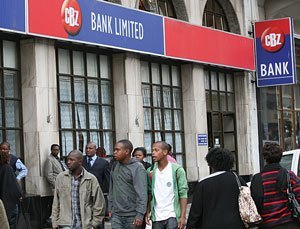
CBZ Holdings has begun work on the US$18 million housing project in Gweru, a move that is expected to ease housing shortages in the country’s third largest city.
BY NDAMU SANDU
Laura Gwatiringa, the group executive (Marketing, Corporate Affairs and Training), said the first phase which involved putting up the sewer system, water reticulation and roads would cost US$8 million.
The second phase which involves building core houses will commence in the first quarter of 2015 and will see the construction of 1 095 core houses at a cost of US$10 million.
Gwatiringa said the Nehosho project would be financed by “external lines of credit and internal deposit mobilisation through the Cash Plus Housing savings product and employer assisted schemes”.
“The Nehosho housing project is being funded from an external line of credit, Shelter Afrique to the tune of US$8,3 million while the difference from the total cost of US$18 million will be met through Cash Plus, employer assisted and other internal sources,” Gwatiringa said.
Cash Plus is a term deposit savings account which does not incur charges but earns interest. At the end of the saving period, the account holder can borrow twice the amount deposited.
The savings account has managed to mobilise US$20 million and a third of the deposits were channelled towards housing.
- Gweru youths venture into trash economy
- Nasty Trixxx, Madiz in surprise reunion
- Kuvimba snaps up 50% GDI shares
- Diamond Berry holds Winter Affair
Keep Reading
The land in Nehosho in Gweru, is part of the over US$66 million land bank the group holds across the country.
The land bank has high, medium and low-density residential stands. Financial institutions are offering mortgages to get tax incentives.
Zimbabwe has a housing backlog of 1,5 million people, a third of which are in Harare.
Statistics from the Zimbabwe Association of Housing Finance — a grouping of Central African Building Society (Cabs), CBZ Bank, FBC Bank and ZB Building Society — showed that mortgage lending had grown by 29% to US$84 million last year.
According to the new economic blueprint, the Zimbabwe Agenda for Sustainable Socio-Economic transformation (Zim Asset), government plans to construct 125 000 housing units by 2018.
This would be attained through the provision of housing stands, strengthening of public private sector partnerships and recapitalisation of the National Housing and National Guarantee Fund, among others.
Local banks are constrained to offer long-term loans or mortgages due to the highly transitory nature of deposits.
As a result, banks have gone offshore to seek medium to long- term lines of credit for on lending to various sectors of the economy.











